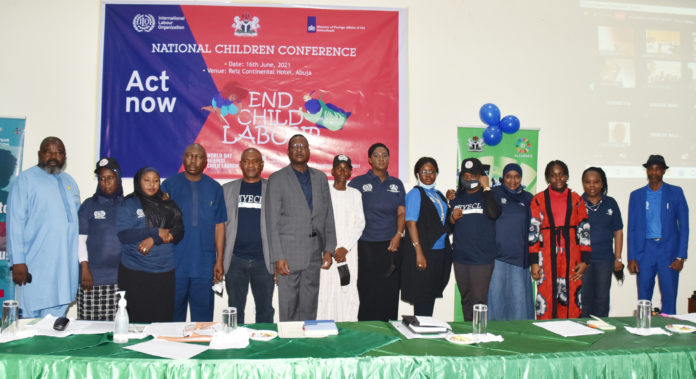The Federal Government has created an enabling environment for the fight against Child Labour through the ratification and adoption of key International Labour Organization (ILO) Conventions.
Minister for Labour and Employment, Dr Chris Ngige, stated this in Abuja as he briefed the media, as part of activities lined up for the commemoration of the 2021 World Day Against Child Labour.
He noted that Government had also approved a number of policy documents on Child Labour, and ratified and domesticated International Conventions against child labour, as well as adopted other measures.
He disclosed that in the fight against child labour, Government was however battling with some challenges, such as “poverty, cultural/religious factors, poor education system, inadequate social protection strategy, and wrong perception/ignorance of the effect of child labour a d wrong or misinterpretation of the Almajiti system etc.”
The key International Conventions include Elimination of the Worst Forms of Child Labour Convention No. 182 (1999), Minimum Age Convention No. 138 (1970), Optional Protocol to the CRC on the Sale of Children, Child Prostitution and Child Pornography (2000), among others.
Ngige explained that the National Policy documents on Child Labour, approved by Government, are National Policy on Child Labour; National Action Plan for the Elimination of Child Labour in Nigeria, and A Comprehensive List of Hazardous Work.
According to him, the ratified and domesticated International Conventions against Child Labour include ILO Convention for the Elimination of the Worst Forms of Child Labour No. 182 (1999); ILO Convention on Minimum Age No. 138 (1970); UN Convention on the Rights of the Child (1989), among others.
The Minister said that other measures adopted by Government include the establishment of National Steering Committee on Child Labour (NSCCL), and the constitution and inauguration of State Steering Committees on Child Labour (SSCCL).
Ngige also noted the ongoing Social Investment Programs of the Federal Government – N-Power, Conditional Cash Transfer, Home Grown School Feeding Programme, and others – “aimed at creating jobs, reducing poverty, increasing school enrolment and eradicating Child Labour.”
The Minister stated that this year’s World Day Against Child Labour, with the theme “Act Now: End Child Labour”, “focuses on pledges made for the 2021 International Year for the Elimination of Child Labour and the need to take immediate action to accelerate progress on the elimination of Child Labour.”
According to him, this year’s event would be observed from 10 – 17 June, tagged “Week of Action”, with series of activities including “the launch of the new global estimates on Child Labour.”
He disclosed that the activities would be an opportunity for partners to showcase progress made in carrying out their “2021 Action Pledges.”

The activities lined up for the event also include dialogue between members of the Children Parliament, National Child Labour Focal Person (Mr Alliance) and other partners on the elimination of Child Labour, the achievement of the Action Pledge, progress reports and updates on action pledges.
According to Ngige, the event would address the collective responsibility of state and non-state actors – parents, children, partners, employers’ and workers’s organisations, policy makers, law enforcement agencies – in ending child labour.
Country Director of the ILO Office for Nigeria, Ghana, Liberia and Sierra Leone, Ms Vanessa Lerato Phala, commended Nigeria for taking committed and conscious steps in working with the global community to fight child labour.
She called for collaboration among social partners, with contributions from International agencies and international donor communities, in order to deal with poverty and inequality, which she described as drivers of child labour.
Phala pledged the commitment of ILO to work with Nigeria, and social partners; to provide technical support, as well as “work collaboratively in mobilizing resources to add to our effort, and to forge ahead in our quest to save our children from child labour.”
Charles Akpan
Deputy Director/Head (Press and Public Relations)
16th June, 2021





